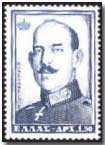Who's Who - King Constantine I
 Constantine I (1868-1923), the eldest son of George I, who came to power
with the assassination of his father in 1913, ruled Greece twice, from
1913-17 and again from 1920-22.
Constantine I (1868-1923), the eldest son of George I, who came to power
with the assassination of his father in 1913, ruled Greece twice, from
1913-17 and again from 1920-22.
Prior to war in 1914 Constantine, as Crown Prince, had led the Greek forces during the successful Balkan Wars of 1912-13. He ascended to the throne on 8 March 1913 with the news of his father's death in Salonika.
Following an education in Germany, a spell spent serving in the Prussian army, and then marriage to the German Kaiser's sister Sophia (in 1889), Constantine's sympathies naturally lay more towards the Central Powers than to the Entente Powers once war broke out in August 1914.
Nevertheless he was faced with the difficulty of determining officially where Greece's support lay once war was underway. This task was complicated by the plain fact that his government, led by Eleutherios Venizelos, was determinedly pro-Allied; added to this was the uncomfortable realisation that the Entente Powers were in possession of naval dominance of the Mediterranean.
Constantine's true sympathies came out during the Allies' disastrous Dardanelles campaign. Despite popular support recently demonstrated at the general election of March 1915 where Venizelos won a landslide victory, Constantine dismissed Venizelos as Prime Minister in October 1915 in view of his increasing support for the Allies, and in his stead placed a succession of puppet premiers, all swayed by the King.
Venizelos retired to Thessalonica where with the support of the Allies he established a provisional revolutionary government, much to Constantine's dissatisfaction.
 With
civil war apparently imminent in 1916 Constantine sought, from Germany, firm
promises of naval, military and economic assistance - without success.
With
civil war apparently imminent in 1916 Constantine sought, from Germany, firm
promises of naval, military and economic assistance - without success.
Meanwhile the Allies had lost patience with the King and threatened an invasion of Greece (sponsored by Venizelos) unless Constantine abdicated.
Consequently, and after some delay, Constantine reluctantly abdicated in June 1917 in favour of his second son Alexander and sought exile in Switzerland (click here to read Alexander's inaugural proclamation). While there he continued to harass the Greek government led once again by Venizelos.
With Alexander's death in October 1920 (from a monkey bite) Constantine returned to the Greek throne in the wake of a plebiscite calling for his return, but was again ousted in 1922 following Greek military defeats against the Turks in Anatolia and Smyrna. He died the following year in exile in Sicily.
Click here to read Constantine's letter to neutral governments in January 1917, protesting Allied interference in Greek affairs. Click here to read French Minister Auguste Gauvain's memoir of the events which led to Constantine's abdication.
Both British and German fleets had around 45 submarines available at the time of the Battle of Jutland, but none were put to use.
- Did you know?
